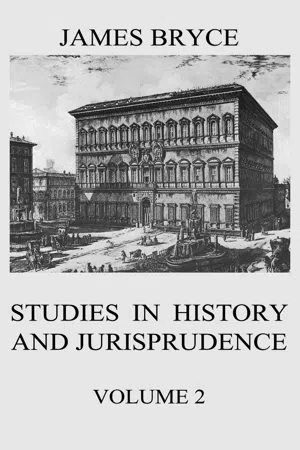Footnotes:
Ref. 002
See as to the doctrine of Hobbes, the Essay on Sovereignty which follows this Essay.
Ref. 003
Some of these succeeded to thrones already established, but their careers illustrate none the less the results effected by brilliant gifts appearing in the midst of a comparatively inert people.
Ref. 004
This pessimist omits to notice that interference by the State or by such quasidespotic combinations of workmen may have been deemed the only means of escaping from submission to organizations of capitalists capable of exercising a tyranny through the forms of the law. He would however reply that this fact did not tell against his thesis that, one way or another, people are not becoming more fully masters of their own lives and fates.
Ref. 005
Some remarks upon this feature of the United States may be found in the author’s American Commonwealth, vol. ii. chap. lxxxv, ‘The Fatalism of the Multitude.’
Ref. 006
The heads of monasteries seem to have been sometimes familiarly described as Sovereigns in the Middle Ages. The name Sovereign was down till very recent times used to describe the head of a municipality in several Irish boroughs. Probably other similar instances might be collected.
Ref. 007
This seems to be the case in Spain. Some of the republics of antiquity professed to have unchangeable laws, but few, if any, of these fully answered to the conception of a Rigid Constitution as we understand it. See Essay III, p. 124.
Ref. 008
I pass by the sense in which it is applied to the person of a monarch, whether limited or absolute, as the king is in any country called the Sovereign, because that sense is not liable to be confused with the purely legal sense. A Nominal Sovereign need not be, and often is not, either a Legal or a Practical Sovereign.
Ref. 009
During part of Lewis the Fifteenth’s reign Madame Du Barry might almost have been, and probably was, described as sovereign de facto of France.
Ref. 010
11 Henry VII, cap. 1.
Ref. 011
Thus the Constitution of Guatemala directs: ‘Esta Constitucion no perderá su fuerza y vigor auncuando por alguna rebelion se interrumpa su observancia.’ I take this instance from the book of M. Ch. Borgeaud, Êtablissement et Révision des Constitutions, p. 236.
Ref. 012
As to the Senate’s right of legislation, see Essay XIV, p. 716.
Ref. 013
At one moment, after the death of Caligula, it was proposed in the Senate to set to work anew the republican constitution, which had never been formally superseded.
Ref. 014
Dig. I. 3, 32, § 1 (cf. Inst. i. 2, 11). In the Institutes of Justinian the Emperor’s legislative power, though complete, is still grounded on a delegation formerly made by the people.
Ref. 015
They frequently altered the language of the old jurists to make it suit their own time, so it is the more noteworthy that the ancient terms have in this instance not been altered.
Ref. 016
See as to the distinction between that part of the Law of God which is also the Law of Nature and other parts thereof, Essay XI, p. 594.
Ref. 017
Nevertheless the followers of Arnold of Brescia in Rome attempted to claim for the Roman people the right of choosing the Emperor; while there were others who argued that the true representatives of the old Roman people were to be found in the whole Christian community of the Empire.
Ref. 018
A full and instructive account of this writer’s theories is contained in the admirable book of Professor Otto Gierke, Johannes Althusius und die Entwickelung der naturrechtlichen Staatstheorien, which is a repertory of information regarding mediaeval and post-mediaeval doctrines of the State.
Ref. 019
Hobbes goes so far as to wish to extinguish the right of private judgement, and deems it part of the duty of the Sovereign to prescribe opinions to his subjects, and in particular to inculcate the true doctrine of Sovereignty.
Ref. 020
Austin so far feels the difficulty of fitting his theory to the case of tyrannies as to imply that it is to be applied in settled States only. But this is to admit pre tanto the inadequacy of the theory.
Ref. 021
An Austinian might perhaps say that the Austro-Hungarian monarchy consists of two separate States, with no single Sovereign. But it is unquestionably one State in the eye of international law, and the Delegations have some powers incompatible with the existence of an Austinian sovereign in either half of the monarchy.
Ref. 022
The position of Bosnia, occupied by Austria but not yet formally severed from the Ottoman Empire, is somewhat different. It may be compared with that of Lothian in the hands of the king of Scots about the end of the tenth century, though in that case there may have been a quasi-feudal relation.
Ref. 023
Indeed the recognition of the Great Council of the nation as the chief power in the State is still older: though its exclusive supremacy, i.e. its right to interfere with certain branches of the prerogative of on...
